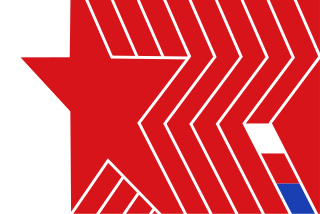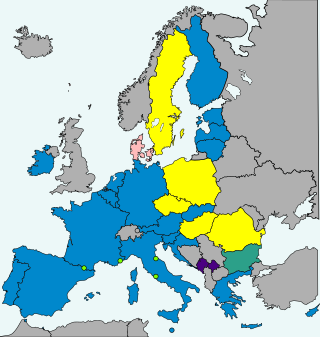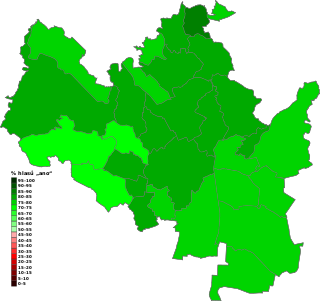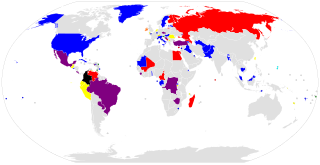
The Czech Republic, also known as Czechia, is a landlocked country in Central Europe. Historically known as Bohemia, it is bordered by Austria to the south, Germany to the west, Poland to the northeast, and Slovakia to the southeast. The Czech Republic has a hilly landscape that covers an area of 78,871 square kilometers (30,452 sq mi) with a mostly temperate continental and oceanic climate. The capital and largest city is Prague; other major cities and urban areas include Brno, Ostrava, Plzeň and Liberec.

The euro area, commonly called the eurozone (EZ), is a currency union of 20 member states of the European Union (EU) that have adopted the euro (€) as their primary currency and sole legal tender, and have thus fully implemented EMU policies.

The Communist Party of Bohemia and Moravia is a communist party in the Czech Republic. As of 2022, KSČM has a membership of 20,450, and is a member party of The Left in the European Parliament – GUE/NGL in the European Parliament, and an observer member of the European Left Party. Sources variously describe the party as either left-wing or far-left on the political spectrum. It is one of the few former ruling parties in post-Communist Central Eastern Europe to have not dropped the Communist title from its name, although it has changed its party program to adhere to laws adopted after 1989.

Social Democracy, known as the Czech Social Democratic Party until 10 June 2023, is a social-democratic political party in the Czech Republic. Sitting on the centre-left of the political spectrum and holding pro-European views, it is a member of the Party of European Socialists, the Socialist International, and the Progressive Alliance. Masaryk Democratic Academy is the party-affiliated's think tank.

The Civic Democratic Party is a conservative and soft Eurosceptic political party in the Czech Republic. The party generally sits centre-right to right-wing on the political spectrum, and holds 34 seats in the Chamber of Deputies, and is the second strongest party by number of seats following the 2021 election. It is the only political party in the Czech Republic that has maintained an uninterrupted representation in the Chamber of Deputies.
Regular elections in Croatia are mandated by the Constitution and legislation enacted by Parliament. The presidency, Parliament, county prefects and assemblies, city and town mayors, and city and municipal councils are all elective offices. Since 1990, seven presidential elections have been held. During the same period, ten parliamentary elections were also held. In addition, there were nine nationwide local elections. Croatia has also held three elections to elect members of the European Parliament following its accession to the EU on 1 July 2013.

Elections in Portugal are free, fair, and regularly held, in accordance with election law.

All elections in the Czech Republic are based on the principle of universal suffrage. Any adult citizen who is at least 18 years old can vote, except those who have been stripped of their legal capacities by a court, usually on the basis of mental illness. Elected representatives are elected directly by the citizens without any intermediaries. Election laws are not part of the constitution, but – unlike regular laws – they cannot be changed without the consensus of both houses of the Parliament. The Czech Republic uses a two-round plurality voting system for the presidential and Senate elections and an open party-list proportional representation system for all other elections. The proportional representation system uses the D'Hondt method for allocating seats.

The Czech Republic is bound to adopt the euro in the future and to join the eurozone once it has satisfied the euro convergence criteria by the Treaty of Accession since it joined the European Union (EU) in 2004. The Czech Republic is therefore a candidate for the enlargement of the eurozone and it uses the Czech koruna as its currency, regulated by the Czech National Bank, a member of the European System of Central Banks, and does not participate in European Exchange Rate Mechanism II.

The European Union (EU) is a political and economic union of 27 member states that are party to the EU's founding treaties, and thereby subject to the privileges and obligations of membership. They have agreed by the treaties to share their own sovereignty through the institutions of the European Union in certain aspects of government. State governments must agree unanimously in the Council for the union to adopt some policies; for others, collective decisions are made by qualified majority voting. These obligations and sharing of sovereignty within the EU make it unique among international organisations, as it has established its own legal order which by the provisions of the founding treaties is both legally binding and supreme on all the member states. A founding principle of the union is subsidiarity, meaning that decisions are taken collectively if and only if they cannot realistically be taken individually.

The enlargement of the eurozone is an ongoing process within the European Union (EU). All member states of the European Union, except Denmark which negotiated an opt-out from the provisions, are obliged to adopt the euro as their sole currency once they meet the criteria, which include: complying with the debt and deficit criteria outlined by the Stability and Growth Pact, keeping inflation and long-term governmental interest rates below certain reference values, stabilising their currency's exchange rate versus the euro by participating in the European Exchange Rate Mechanism, and ensuring that their national laws comply with the ECB statute, ESCB statute and articles 130+131 of the Treaty on the Functioning of the European Union. The obligation for EU member states to adopt the euro was first outlined by article 109.1j of the Maastricht Treaty of 1992, which became binding on all new member states by the terms of their treaties of accession.

In general, the law of the European Union is valid in all of the twenty-seven European Union member states. However, occasionally member states negotiate certain opt-outs from legislation or treaties of the European Union, meaning they do not have to participate in certain policy areas. Currently, three states have such opt-outs: Denmark, Ireland and Poland. The United Kingdom had four opt-outs before leaving the Union.

The Treaty of Accession 2011 is an agreement between the member states of the European Union and Croatia concerning Croatia's accession to the EU. It was signed on 9 December 2011 in Brussels by the heads of state or government of the 27 member states and by the president of Croatia, Ivo Josipović, and Prime Minister Jadranka Kosor.

ANO 2011, often shortened to simply ANO, the initials meaning Action of Dissatisfied Citizens, is a populist political party in the Czech Republic. The party has been labelled as centrist on the political spectrum by some sources, while others state that it is a centre-right party. At the European level ANO is a member of the Alliance of Liberals and Democrats for Europe Party and the Renew Europe group in the European Parliament. The party is led by entrepreneur Andrej Babiš, who served as Prime Minister in 2017–2021.
A referendum is a direct vote in which an entire electorate is asked to either accept or reject a particular proposal. This article summarises referendum laws and practice in various countries.

The Treaties of the European Union are a set of international treaties between the European Union (EU) member states which sets out the EU's constitutional basis. They establish the various EU institutions together with their remit, procedures and objectives. The EU can only act within the competences granted to it through these treaties and amendment to the treaties requires the agreement and ratification of every single signatory.
Freedom and Direct Democracy is a right-wing populist political party in the Czech Republic. It is led by Tomio Okamura and it holds 20 seats in the Chamber of Deputies.

Brno central station referendum, 2016, is a municipal referendum on the location of Brno main railway station, in Brno, Moravia, Czech Republic and the way of its future modernisation. Citizens will vote on whether to retain the station at its current location and modernise it, or replace it with a new station at another location. The result of the referendum binds only local government. Nevertheless, it also indirectly affects government organs in the Czech Republic through the already existing system of contractual obligations. The date of referendum is set on 7 and 8 October 2016, the same day as regional elections.

This national electoral calendar for 2018 lists the national/federal elections held in 2018 in all sovereign states and their dependent territories. By-elections are excluded, though national referendums are included.
This local electoral calendar for 2018 lists the subnational elections held in 2018. Referendums, retention elections, and national by-elections are also included.
















